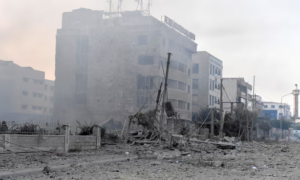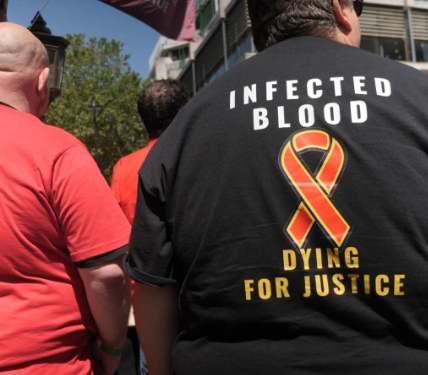Attacks on Lebanese capital continue as many reported dead in Israeli airstrike on mosque in central Gaza

Damaged buildings in Beirut, Lebanon, after an Israeli strike on Sunday. Photograph: EPA
The UK government is advising Israel to show “restraint” as Keir Starmer warned that “sparks”’ from the Middle East conflict could “light touchpapers in our communities at home”.
As the war between Israel and Hamas in the Palestinian territory approaches its first anniversary, on 7 October, Israeli strikes on Saturday night sent shock waves across the Lebanese capital, following days of Israeli bombing in suburbs of the city that are thought to be strongholds for the Iran-backed group Hezbollah.
Meanwhile, Gaza’s civil defence agency said 24 people were killed and dozens wounded in an Israeli airstrike on a mosque in central Gaza early on Sunday. One hundred and one Israeli hostages taken on 7 October 2023 have still not been freed.
Peter Kyle, a UK cabinet minister, did not rule out the possibility of the UK military helping Israel attack Iran, but noted any “operational decision to be taken” would be based on “delicate negotiations”.
Kyle also noted the prime minister has spoken to the UK’s allies in the last few days, including President Biden, President Macron and Chancellor Schultz, resulting in “unanimous” advice that Israel “must exercise restraint” in the region. However, Kyle said the UK government “can’t instruct Israel, as a sovereign state to do anything”.
Speaking on the BBC One’s programme Sunday with Laura Kuenssberg, Kyle said: “We do understand deeply what Israel has suffered in this year, but the only way forward is restraint, a ceasefire to create the space for a political solution, because this is getting more complicated.
“The war is deepening and it is not moving towards the peace that we need, so we are urging the steps that will take us towards that peaceful settlement”.
The prime minister, in an article for the Sunday Times, called out the ”vile hatred” that had been directed towards Jews and Muslims since the 7 October attacks.

He urged all parties involved in the conflict to “act with restraint and return to political, not military solutions”, having previously expressed his concern that the “region is on the brink” after Iran’s missile attack on Israel.
Writing in the newspaper, he said: “The flames from this deadly conflict now threaten to consume the region. And the sparks light touchpapers in our own communities here at home.”
He added: “There are always some who would use conflict abroad to stoke conflict here. Since October 7, we have watched vile hatred against Jews and Muslims rise in our communities.”
The Foreign, Commonwealth and Development Office said more than 250 people had been able to leave Lebanon so far on the three chartered flights that had already left Beirut.
There are no further scheduled charter flights, but the situation would be kept under review.
The shadow foreign secretary, Andrew Mitchell, told Sky News’s Sunday Morning with Trevor Phillips programme: “The Iranians, of course, have already responded and on both occasions when they attacked – directly from Iran – Israel, British military forces were engaged in trying to help.
“Israel is a very strong ally. Of course we want to see de-escalation, we want to see negotiation and we want to see people’s eyes lifted towards the possibility of a political solution.
Zarah Sultana, an MP who has been suspended from the Labour party and is sitting as an independent, told the BBC “there is no scenario” where the UK’s involvement in an attack on Iran could be justified.
She added: “If we look at the past two decades of British foreign policy in the Middle East there are catalogues of failures and clearly lessons haven’t been learned. When we look at what the British public think, 56% of them back a ban on arms sales to Israel, only 17% oppose that, 67% believe Israel has committed war crimes and 84% want Netanyahu arrested if he enters the UK. Clearly there’s a detachment from the British public opinion and what the government are saying.”
The former long-serving Conservative foreign secretary Sir Malcom Rifkind said what was needed from both the Israelis and the Palestinians was “leadership that is prepared not to forget the past, but to move on to a political dialogue”.




